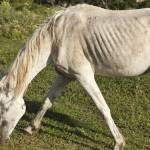Intestinal Parasites and Equine Nutrition

Infestations of parasites usually aren’t fatal to horses, but parasites damage the gastrointestinal tract, may lead to diarrhea or colic, often cause a pot-bellied appearance and a rough coat, and may adversely affect the growth of young horses. Owners may think some or all of these problems are dietary in nature and will try to overcome the problems by changing or increasing the horse’s feed. Actually, deworming the horse as needed will improve his condition without changes being made in feed type or amount.
Some common intestinal worms that affect horses are the large and small strongyles (redworms), roundworms, and pinworms. Stomach bots are the larvae of a type of fly, but they do not cause a major problem to most horses. Other parasites such as threadworms and lungworms rarely cause problems. The common signs of worm infestation are tail rubbing, pale gums, ill-thrift, colic, and poor coats. Severe infestation can also cause diarrhea or sudden death.
Large strongyles are gray, blood-sucking worms, approximately 20 mm long, that are often referred to as redworms or bloodworms. The most important of the group is Strongylus vulgaris. The eggs from adult worms living in the horse’s large intestine are passed out with manure onto pasture where, if the conditions are right, they hatch and develop into infective larvae. When eaten by a horse, the larvae follow a complex migration, passing through the intestinal wall to the inner lining of small arteries, then moving up these to the large arteries supplying the digestive tract. The larval migrations last five to seven months and the larvae eventually return to the intestine where they become adults. The migration of Strongylus vulgaris larvae can cause serious weakening of the walls of arteries and the formation of blood clots. When these clots break away and block smaller arteries supplying sections of the intestines, colic commonly results. On rare occasions, a weakened section of artery wall may rupture, resulting in sudden collapse and death. Another side effect is weakness. Although horses usually pick up worm larvae from pasture, any grassy areas around yards and stables that have been contaminated with manure will also be heavily infested.
Small strongyles are small redworms usually found in the large intestine. The larvae migrate into the gut wall, causing the formation of small nodules. Heavy infestations of small strongyles can cause ill-thrift and diarrhea. These worms have developed resistance to many of the common deworming products, and they are now a great problem to horses. The immature stage hibernates in the gut wall and then emerges to cause substantial damage to the gut.
Roundworms are a common problem in foals and yearlings. Roundworms are creamy-white, almost the thickness of a pencil and up to 50 cm long. You may notice the worms in droppings after deworming young horses. The adult roundworm produces eggs that have a considerable resistance to adverse conditions, and they can survive for several years on pastures and in yards and stables before hatching into larvae. This means eggs from one year’s foals can infect next year’s foals. Once ingested, the larvae migrate through the liver and lungs before becoming adults in the small intestine. These very active worms irritate the intestinal lining and can cause intermittent diarrhea, ill-thrift, and a potbelly. Pneumonia in foals is a common sequel to the lung damage caused by the migrating larvae. Heavy burdens of adult roundworms can cause intestinal obstruction, colic, and occasionally death.
Pinworms are up to 10 cm long and grayish-white. The eggs are eaten with feed and hatch into larvae in the small intestine. The adult female lives in the large intestine and lays eggs near the horse’s anus, causing intense irritation. The commonest indication of pinworm infestation is persistent tail rubbing. Pinworms are most often a problem of stabled horses. Although pinworms are not a particularly serious parasite, horses that continually rub their tails can develop abrasions and unsightly bare areas.
Tapeworms may occasionally cause colic, general unthriftiness, and diarrhea. Problems usually arise in late summer and autumn following infections in late spring and early summer. Although rare, acute symptoms of colic or sudden death can occur from blockage and then rupture of the bowel. Not all deworming products eliminate tapeworms, so check the labels of the products you are using.
Threadworms may cause diarrhea in young foals that are infected through the mare’s milk. Treatment of the mare on the day of foaling and rotation of foaling paddocks will assist control.
Lungworm infestation is a problem when horses are grazed with donkeys. Affected horses may show overall weakness or coughing, but clinical problems are seen more commonly in donkeys.








